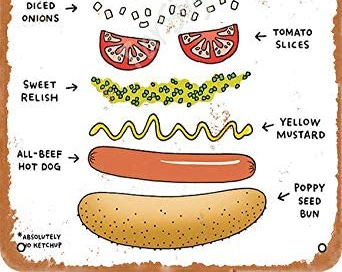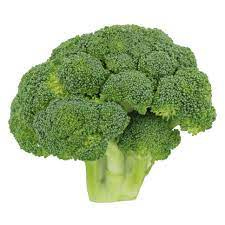Some good news for plant-based diets in dealing with prostate cancer
How about a Chicago-style hot dog "dragged through the garden"?
By Howard Wolinsky
One of the first things I asked when I was diagnosed with prostate cancer in 2010 was whether I should follow a particular diet.
Scott Eggener, MD, of the University of Chicago, who put me on Active Surveillance in 2010, offered no specific advice other than to follow a healthy diet. He may be changing his tune based on a study this week that supports to the benefits of a plant-based diet. He’s one of the co-authors led by Stacy Loeb, MD, Department of Urology NYU Langone and the Manhattan VA.
Generally, when I have asked about diet, I have been given vague recommendations, such as my mother may have given me: Eat your veggies.
Often, I have been told to follow the Mediterranean diet, which emphasizes plant-based foods like fruits and vegetables, potatoes, whole-grains, beans, nuts, seeds and extra virgin olive oil. The diet also includes moderate amounts of lean poultry, fish, seafood, dairy, and eggs.
Brian Helfand, MD, PhD, my current urologist, is from the “do everything in moderation school.” So he endorses an occasional hot dog from Portillo’s in part for the “feel-good” aspect.
Like me, he is a fan of a Chicago-style hot dog “dragged through the garden.”
However, the Mediterranean diet restricts processed foods like hotdogs, added sugar, and refined grains should be restricted. Many studies have shown that the Mediterranean diet can promote weight loss and help prevent heart attacks, strokes, type 2 diabetes, and premature death.
My preventive cardiologist at UChicago advised me to go this way: take care of your heart and your prostate will follow. (I am a mixed success, but my PSA has been in decline.)
Early on, Eggener, knowing my interest in diet, directed me to join in the famed MEAL study, though I was disappointed to land in the control group. They gave me no counseling, other than a brochure. They just called me on occasion to see how I was doing. I was looking for support.
I took matters into my own hands and went on a low-fat diet and low about 30 pounds.
The Men’s Eating and Living (MEAL) study, published in the Journal of the American Medical Association was pretty much of a dud, for hopeful veggie lovers anyway.
Back then, guidelines recommended that men with prostate cancer eat a vegetable-rich diet, suggesting it might decrease cancer progression and death.
But MEAL found patients with prostate cancer assigned to eat seven or more servings of vegetables and fruits daily saw no extra protection from the increased consumption of micronutrients.
Recently, I attended a major meeting on the future of active surveillance. Howard Parnes, MD, chief of the Prostate and Urologic Cancer Research Group in the National Cancer Institute’s Division of Cancer Prevention, told the breakout group I attended that the NCI has been looking for the magic foods that would help with prostate cancer, and has come up empty.
However, a study published this week in one of the Nature publications is coming to different conclusions.
(Stacy Loeb, MD)
The new study, led by Loeb, published this week in Prostate Cancer and Prostatic Diseases shows that a plant-based diet may yet hold out some hope.
With the help of an experienced medical librarian, the research group, coming from major research institutions in the U.S., performed a systematic database and citation search in February 2022. Studies were included if they reported primary data on plant-based dietary patterns, such as vegan, vegetarian, plant-based, and incidence among at-risk men for prostate cancer, or oncologic, general health/nutrition, or quality of life outcomes among patients with prostate cancer or caregivers.
Thirty-two publications were eligible for the qualitative synthesis, representing five interventional and 11 observational studies.
The interventional studies primarily focused on lifestyle modification, including plant-based diets for men on active surveillance for localized prostate cancer or with biochemical recurrence after treatment, showing improvements in short-term oncologic outcomes alongside improvements in general health and nutrition. Observational studies primarily focused on prostate cancer risk, showing either protective or lack of associations for plant-based dietary patterns.
Loeb et al. noted that studies of the vegan diet consistently showed favorable associations with risk and/or outcomes. Gaps in the current literature include the impact for long-term disease-specific outcomes.
The researchers concluded: “Interventional studies showed generally favorable results of lifestyle modifications incorporating a plant-based diet with prostate cancer outcomes as well as improvements in nutrition and general health. Observational studies demonstrated either a lower risk of prostate cancer or no significant difference.
“These results are encouraging in light of the many benefits of plant-based diets for overall health, as well as environmental sustainability and animal welfare.”
So, eat up that broccoli and the rest of those goodies. They just might help and certainly won’t hurt.
Meanwhile, join the ASPI program on diet: “Eat to Beat Prostate Cancer,” at 12p.m. Eastern July 30 featuring Dr. William Li, a famed TED talker on diet and cancer.
Free Registration: www.aspatients.org or go direct to: https://bit.ly/3t5lFLx
Free prostate-healthy recipes for all registrants.
More info: info@aspatients.org; or DrDavidKingKeller@gmail.com
Stacy Loeb, MD, of NYU Langone, and Justin Gregg, MD, of MD Anderson, recently presented a webinar on diet and other lifestyle factors to the AnCan group. To view, go to: https://us06web.zoom.us/webinar/register/WN_eUvLX0yNSAmRe5b-ST7zeg.
Join Dr. Channing Paller, associate professor of Oncology and Urology at Johns Hopkins University, Sidney Kimmel Comprehensive Cancer Center, and Rob Finch, Director of Urology Medical Affairs at Myriad Genetics as they discuss the impact of genetic factors in prostate cancer and the PROMISE study.
Genetics, the PROMISE Study, and Prostate Cancer: a Town Hall Webinar
July 20, 6:00 p.m. - 7:00 p.m. Eastern Time
Register: https://bit.ly/3ypgAzr
Join a ZERO webinar, Prostate Cancer and the Unique Needs of the LGBTQIA+ Community featuring Anne Katz PhD, RN, FAAN, of CancerCare Manitoba, Winnipeg. It will July 27, 2022 at 06:30 PM Eastern.
Register here: https://us06web.zoom.us/webinar/register/WN_eUvLX0yNSAmRe5b-ST7zeg.






![Dr. Stacy Loeb, NYU Langone He [IMAGE] | EurekAlert! Science News Releases Dr. Stacy Loeb, NYU Langone He [IMAGE] | EurekAlert! Science News Releases](https://substackcdn.com/image/fetch/$s_!om7b!,w_1456,c_limit,f_auto,q_auto:good,fl_progressive:steep/https%3A%2F%2Fbucketeer-e05bbc84-baa3-437e-9518-adb32be77984.s3.amazonaws.com%2Fpublic%2Fimages%2F6d7b237a-dbda-4b34-a1bc-28fa39c066e1_720x466.jpeg)


Thanks for sharing, Dan. Sounds like you're in a good place, Howard
I became aware of diet and prostate cancer when first diagnosed 4&1/2 years ago. In 2018, at a very early PCSG meeting in Sacramento, I saw a video where Dr. Charles "Snuffy" Meyers said that Omega 6 foods "add fuel to the fire". Popcorn was my favorite snack food. When learned that corn is high in Omega 6, I gave away my cool popcorn popper and stopped eating sweet corn in the summer as well as other corn products since corn is high in Omega 6.
I have SiriusXM radio and have been listening to the weekly "Men's Health" program on the Doctor Channel. I actually record the program and have recordings that go back to over 4 years ago. I especially like hearing Dr. Stacy Loeb. She has done research on prostate cancer, and I've learned much from her. I remember Dr. Loeb saying that prostate cancer is one of her "favorite things to talk about". She recently said that she has also started eating a healthy plant-based diet.
My urologist had also recommended more of a plant-based foods and so I've been on a mostly vegetarian diet for the last 3 years. I've given up most dairy products substituting dairy milk with walnut milk and flax milk. Both are high in Omega 3, the "good Omega". Since adjusting my diet in 2019, I have had 5 PSA scores that averaged 38% lower than the average of my prior 3 PSA scores. I believe the vegetarian diet has made a difference.
I had a prostate biopsy 4&1/2 years ago but did not have a confirmatory biopsy. I now have an interest in having a Trans Perineal biopsy. My new urologist in Idaho, who I like very much, has been doing TP biopsies for about 6 months. He will do a TP biopsy if I want one, but noting the direction of my PSA scores, it seems there is no urgency to do so.